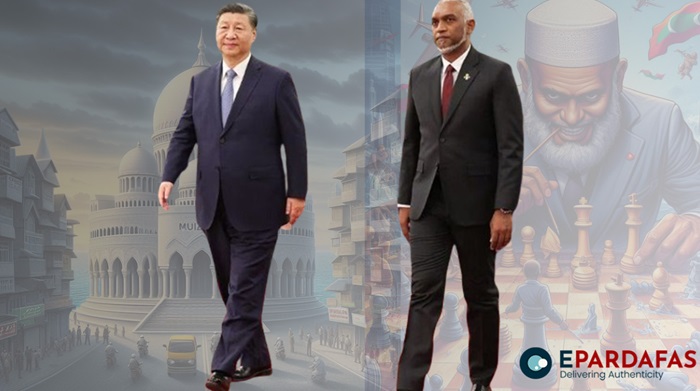
Ever since Mohammad Muizzu’s win in the presidential election of Maldives, Male has been facing the consequences of a detrimental electoral campaign. By hinging the electoral roadmap upon the ‘India Out’ campaign, the People’s National Congress (PNC) now has to live up to certain obnoxious claims it had made in the lead up to the elections.
From propagating the removal of Indian armed forces to reducing Maldives economic and political dependence on New Delhi, the party currently in power has attempted every trick in the book to delegitimize Indian bilateral efforts. However, voices from within Maldives seem to disagree with Muizzu’s exaggerated claims and counter-promises. As per former Maldivian foreign minister Abdulla Shahid, the claim of thousands of Indian military personnel being present on the island country was part of the string of lies that the President has falsely propagated for months.
The cost of a short-sighted political play
There remains no doubt that in Mohammad Muizzu’s Maldives, China seeks to benefit the most. However, the question remains, at what cost? By choosing to visit Turkey and China for his first bilateral visits as President, Muizzu all but attempted to send a strong signal against India. The visit to Beijing especially, may have at the face of it, seemed to be a successful one with the signing of a cooperative partnership as well as committing to implement the previously signed Free Trade Agreement in place, yet will ultimately prove to be detrimental for Maldives long term development if not just its economy. The fact that Maldives owes a staggering 32 per cent of its overall foreign loans to one specific country, should in itself explain the status of Maldives’ economy.
While the whole world seems to be worried about accepting further finances from China, Maldives on the other hand is openly projecting its willingness to do so. This was quite evident President Muizzu during his visit to Beijing reiterated the importance of projects such as the Belt and Road Initiative (BRI), disregarding the economic hardships Maldives’ Neighbours in the South Asian region have faced in the past two years due to over-inflated loans under the pretext of the BRI.
Lessons to be learnt from Male’s past experiences
A prominent example within Maldives’ recent past of a similar mischievous Chinese loan stands to be the China-Maldives Friendship Bridge. Constructed within a budget of $200 million granted by Beijing through different financial schemes, the project faced severe delays and roadblocks up until its inauguration a few years ago.
Moreover, environmentalists have frequently questioned the ecological consequences including the degradation of coral reefs and aquatic wildlife that would be severely affected due to the bridge itself. The details of the repayment of the loans under which such a project was completed still remains under the rug with the government maintaining secrecy over the interest rates as well. Another prominent example of Beijing’s hawkish economic approach in Maldives, is the example of China’s Exim Bank ordering the Maldivian government to repay $10 million in 2020 when a prominent business tycoon in the island nation defaulted on his repayments. The initial $127 million sovereign-guaranteed loan in itself was questionable in the first place with only state-actors being granted such massive finances instead of business entities.
The obvious question that then stands out- why were such loans granted if the repayment in itself was under question? The answer lies in the deployment of Beijing’s neo-imperialist strategies.
These are but a few examples of Beijing’s hawkish economic approach upon the island nation of Maldives. Although New Delhi on its part has played a far more mature role, Muizzu’s government seems to want to polarize the country’s population against India. Instead of focusing upon policies and practices in mitigating severe challenges that the country faces, the government in power seeks to deteriorate its relations with a decades old ally in India.
Matters such as unemployment and Islamic radicalism have severely plagued Male development and has furthermore degraded the country’s international stature. As far as figures are concerned, Maldives alone provided the highest number of foreign fighters per capita to ISIS. These challenges require the government’s undivided attention apart from international help that could help it mitigate the challenges. Instead of focusing upon these issues, Male is presently procuring even further debt from Beijing that has not only positioned its economy into a risky position but has also grabbed global attention regarding the risky nature of investing in the country.
In these circumstances, it would perhaps be fair to conclude that Male requires a serious course correction; one that focuses on serious challenges that its economy and politics faces instead of playing a detrimental game of siding with one power at the cost of the other. Muizzu’s Maldives would perhaps then benefit if it balanced its approach with both countries and focuses on immediate issues that could potentially, if not addressed, lead to the demise of his political reign of power. (Epardafas)